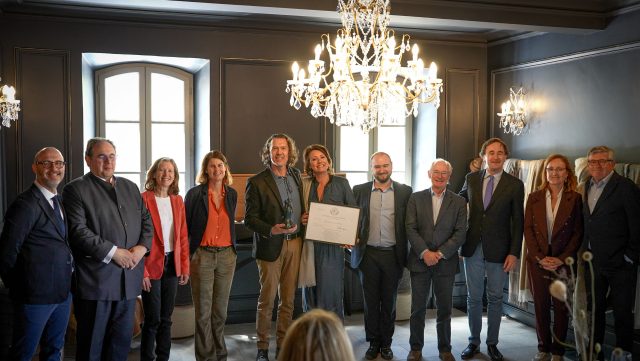This website uses cookies so that we can provide you with the best user experience possible. Cookie information is stored in your browser and performs functions such as recognising you when you return to our website and helping our team to understand which sections of the website you find most interesting and useful.
PFV Prize shows how fine wine and wool are intertwined
Provençal wool mill Brun de Vian-Tiran was officially presented with the Primum Familiae Vini (PFV) ‘Family is Sustainability’ Prize in a ceremony in Southern France yesterday.

PFV, a group of 12 of Europe’s most influential family-run wine producers (limited to a dozen to reflect the number of bottles in a case), includes the likes of Baron Philippe de Rothschild, Pol Roger, Symington Family Estates, Tenuta San Guido and Familia Torres.
Brun de Vian-Tiran was chosen as the recipient of the second edition of the organisation’s prize, which seeks to recognise family firms of exceptional quality and rewards the winner with a €100,000 cheque for a development project as well. Founded in 1808 in the town of L’Isle-sur-la-Sorgue, the business has been under the custody of eight generations of the Brun family, and specialises in the processing of noble fibres.
Matthieu Perrin, there both in his capacity as PFV chairman and as a representative of Famille Perrin (whose Domaine du Clos des Tourelles estate was the site of the prize giving lunch), said that handing on the baton was a crucial aspect of all family-run businesses: “We all see ourselves not as owners, but as passers on…We contribute what we can to perpetuate our heritage and build the future.”
Perrin then stated that PFV saw the same “family values, innovation, creativity, and necessary touch of madness” in both its constituent wine estates and Brun de Vian-Tiran, as well as the mill’s support of “local partners and the community”.
The connection between wool and wine may seem threadbare to some, restricted to the lanolin aroma in a glass of Sémillon, though Baron Philippe de Rothschild’s Julien de Beaumarchais joked that there is indeed a ‘mouton’ in Mouton Rothschild. However, Jean-Louis Brun, the mill’s managing director, argued during a tour of the production facility that to suggest the production of the two have a great deal in common would not be spinning a yarn.
He said that, like fine wine, wool does have its own recognisable terroir, dependent on where the animal, be it a camel or cashmere goat, has grazed. He noted that animals that graze on richer grass tend to producer thicker, lower-quality fleeces, prompting Alessia Antinori, of the eponymous Tuscan estate, to draw a parallel between this and vine stress producing better quality fruit.
Blending also plays an important role, in this case for optimising the fabric’s texture: “Just as there is no good or bad grape variety, it depends where you plant it and how you use it, it is the same for wool.”
However, while a winemaker might combine varieties planted in different vineyards of the same region, for wool the geographical range of blending potential is much wider: “We might blend French wool, which is fluffy, but not so soft, with Australian wool, which is softer, but flat.”
Brun’s father, Pierre Brun, also pointed out that Brun de Vian-Tiran does not refer to this mixing process as “melange” but instead opts for the winemaking term “assemblage”.
Much like how a wine is checked for faults before bottling, a similar approach is rigorously applied to every square inch of each scarf and shawl manufactured at the mill. And, like fine wine, Brun de Vian-Tiran’s products are said to have a long lifespan: “Our fabrics last for more than 60 years.”
Upon receiving the award, Jean-Louis Brun, who was also speaking on behalf of his father, drew out the comparison further: “Our family business values are not driven by brands, or opportunities, they are driven by a culture…Time is not the enemy that runs against us, time is a friend that allows the building of that culture…The time to grow a vine, to age a cuvée of Champagne, the time to produce a woollen throw.”
The winners of the 2021 inaugural edition of the prize, the father and son leading Maison Bernard in Brussels, Europe’s oldest luthier workshop, were also present at the ceremony.

